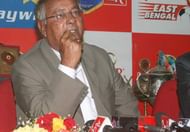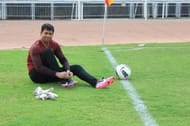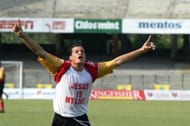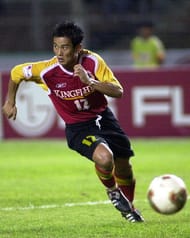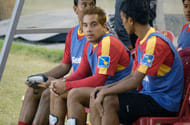International honours on foreign soil are a rarity for Indian football teams and if we consider the club sides, such success has only been achieved in invitational tournaments. But one such club triumph stands out above every other and in fact can be considered as one of the greatest achievements in Indian football history.
The triumph in question is the ASEAN Cup success of East Bengal with the victory in the final coming on this date, July 26, ten years ago. Unlike other success stories of Indian clubs in invitational tournaments like the Wai Wai Cup in Nepal in 1993 (won by East Bengal) or POMIS (President of Maldives Invitational Soccer) Cup 2003 (won by Mahindra United) , the standard of teams for the 2003 ASEAN Cup was quite high.
The tournament comprised the domestic winners of all the major South East Asian countries including Thailand champions BEC Tero Sasana, who before the tournament had already progressed to the final of the inaugural edition of the Asian Champions League, the top-most club competition in the continent.
India aren’t a part of ASEAN (Association of South East Asian Nations) of course, thus their domestic champions East Bengal were only entered into the competition through special invitation. India, at that point, were ranked well below most of the stronger ASEAN nations like Thailand, Indonesia, Singapore and Malaysia. Due to a ban from AFC club competitions between 2000 and 2002, Indian clubs were not used to international standards at all and thus East Bengal were only expected to make up the numbers in this 11-team competition, which was held in Indonesia although Vietnam were the original hosts.
East Bengal suffered a 1-0 defeat to BEC Tero Sasana in their opening group game but the performance deserved better. Inspired by that fighting display, the red-and-gold brigade thumped Philippines champions Army FC 6-0 with Bhaichung Bhutia scoring five. It was a three-team group, so one win was enough to set up a quarter-final clash with Indonesian league runners-up Persita Tangerang.
The Kolkata giants defeated Persita 2-1 and then conquered Indonesian champions Petrokima Putra (now Gresik United) on penalties in the semi-final. Surely the dream run would end in the final against overwhelming favourites BEC Tero Sasana. But East Bengal produced a gigantic performance to upset the Thailand club 3-1 on July 26 2003 and created history.
There were many heroes for East Bengal in that tournament but one man was the inspiration and driving force behind the whole success. That individual was the coach Subhash Bhowmick. The former India striker had guided the Kolkata club to NFL (National Football League) success the previous season but this triumph gave him legendary status.
Veteran goalkeeper Sandip Nandy, who now plays for Mohun Bagan, was East Bengal’s custodian back then and was adjudged the best goalkeeper of the tournament. Looking back, even the 38-year-old agreed that it was Bhowmick who made it all possible.
“We owe it to him (Bhowmick) completely. Any praise for him now will fall short actually. Many people might say that it was the players who did it but let’s not forget that he was the first Indian club coach to ensure such scientific preparation before the tournament. And during the competition, he raised our self belief to new heights and kept motivating us throughout. It would have been impossible to achieve this historic triumph without our coach,” Sandip told Sportskeeda.
The pre-tournament preparation that Sandip was referring to was the first of its kind in Indian football. Once East Bengal’s participation in the tournament was confirmed, the whole squad had a camp which comprised a stay in one of the newly-opened luxury hotels of Kolkata. South African physical trainer Kevin Jackson was also brought to get the players in the best physical shape possible. Such professionalism in the build up for a tournament was unheard of in Indian football.
Fair to say, a lot of money was invested and some sections of the local language media blasted Bhowmick for the same. Some of those critics were silenced after a thrashing of arch-rivals Mohun Bagan in the Calcutta Football League (CFL) in the lead up to the tournament and the rest were made to eat their words following the exploits in Indonesia.
“We were lucky to get a chance of playing in that tournament as India was not a member of ASEAN. Therefore the whole pride and prestige of Indian football was on our shoulders and thus the coach recognised that the preparation had to be immaculate. I think we showed the way to the rest of India as to how a team should prepare for a tournament. Nowadays pre-season camps are common but back then it wasn’t. So following our success many other teams starting taking our example,” Alvito D’Cunha, who became a household name after that tournament, told Sportskeeda.
Ten years on, Alvito is still with East Bengal and has gone on to become a club legend. Looking back, Alvito recalled that although he and his teammates made history, the road to success wasn’t smooth.
“It was a memorable tournament and the success would go down as the best achievement of our careers. But we had to fight against the odds throughout the tournament as no one really gave us a chance of winning even one game. Then there was the injury to Debjit (Ghosh), but thank God Douglas (Da Silva) and our doctor Shanti Ranjan Dasgupta did the needful at the right time and saved his life,” Alvito stated.
He was referring to the head injury that Debjit had suffered in the quarter-final against Persita Tangerang. The versatile player was left unconscious but just when everybody around started to panic, Brazilian medio Douglas tried mouth-to-mouth resuscitation on Debjit and Dr Dasgupta provided the necessary medication.
Debjit’s life was saved but he was ruled out for the rest of the tournament and East Bengal suffered a further blow in the semi-final against Petrokima Putra when defender Mahesh Gawli was sent off with the score locked 1-1. Once again though East Bengal’s fighting spirit came alive in the most difficult circumstances as they took the game to penalties. And then kept their nerve to win the shootout 7-6 and set up a final showdown with BEC Tero.
“I was so scared when Debjit was down on the ground senseless. But thankfully Douglas and Santi Da saved his life. Despite winning the quarter-final, instead of celebrating after the game we rushed to the hospital to see him. We used his injury as a further motivation so even when we were down to ten in the semi, we never lost hope and eventually made it through to the final,” said Sandip, undoubtedly the hero of the shootout in the semi-final.
Reaching the final was an achievement in itself and Bhowmick kept things simple by telling his players to enjoy the occasion and not get burdened by it. Clearly that message helped as East Bengal played above themselves against a team that was miles ahead of them technically.
Nigerian striker Mike Okoro opened the scoring in the first half and the celebrations that followed was reminiscent of the one famously done by Brazilian great Bebeto in the 1994 World Cup.
Bhaichung doubled the lead in the second period with a clinical finish. It was the star striker’s eighth strike of the tournament and more than enough to win him the golden boot. Panai Kongprapun pulled one back for BEC Tero but any hope of a comeback was ended by the left-footed Alvito, who incredibly scored a beauty with his right!
Bhowmick’s tactical genius was evident throughout the competition and another example was seen in the final also as his decision to employ Sasti Duley to man mark BEC Tero and Thailand’s best player at the time Therdsak Chaiman paid off with complete success.
It was a triumph for both East Bengal and India with even the club’s Ghanaian captain Suley Musah posing with an Indian flag after the match. The significance of the triumph was further highlighted by the presence of club owner Vijay Mallya, who has hardly attended any games since then but was a regular in that tournament.
There were plenty of Indian flags at the stands of the Gelora Bung Karno International Main Stadium in Jakarta, also the scene of India’s last Asian Games gold in football in 1962, with few passionate fans even making the trip from Kolkata to cheer their favourite club.
The whole squad received a hero’s welcome in the City of Joy with more than 10,000 greeting them at the airport. Such an occasion is unlikely to be repeated for an Indian football team in the near future (or ever again).
“The reception we got after returning to Kolkata was unforgettable,” Alvito recalled. “It was the greatest moment of my career and acted as an inspiration for clubs and players throughout India,” Sandip added.
Subhash Bhowmick dared to dream the impossible of seeing an Indian club win an international tournament on foreign soil and achieved it against so many odds.
He stills dreams of similar success but may not be given that chance again. However this is not the day to regret but celebrate the tenth anniversary of this incredible feat. Stand up for Subhash Bhowmick’s class of 2003 at East Bengal.
Happy ASEAN!
